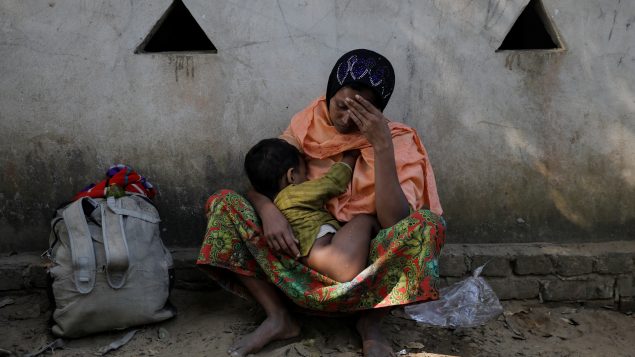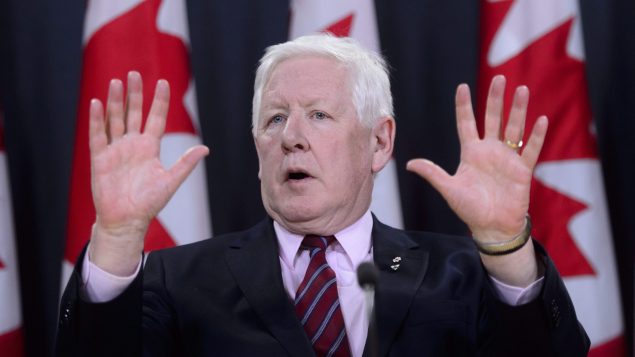Canada should take a leadership role in responding to the current crisis affecting the Rohingya minority by stepping up its humanitarian and development efforts in Bangladesh and Myanmar, Canada’s special envoy to Myanmar, says in his final report.
“Canada’s response should focus on providing humanitarian assistance, education, supporting infrastructure, and mitigating the impact of the violent deportation on Rohingya women and girls by providing strong support to UN and other international organizations working in camps and elsewhere,” Bob Rae said in his report unveiled on Tuesday.
“Education in particular should become a priority for our longer-term approach.”
These recommendations are part of a 17-point to do list drafted by the former Ontario premier and veteran Liberal politician on how Canada and its international partners should respond to the crisis that has seen more than 670,000 of Rohingyas flee the predominantly Buddhist Myanmar, also known as Burma, to neighbouring Bangladesh following a crackdown by Burmese security forces.
The report, entitled Tell them we’re human, also calls on Canada to develop a multi-year funding plan estimated by Rae to cost about $150 million for the next four years.
“Our first obligation is to protect lives,” the report says. “Meeting this obligation will require presence, perseverance, and patience: presence because we cannot cede the entire terrain to those whose commitment to individual freedom and the rule of law has been found badly wanting; perseverance because our efforts will be met with resistance, denial, and at times a refusal to engage; and patience because it will take longer and will require more effort than we currently appreciate.”
Speaking to reporters in Ottawa on Tuesday, Rae said the report’s title was inspired by a conversation at a refugee camp in Bangladesh with a Rohingya teacher.
(click to listen to Bob Rae’s statement)
Listen“I think Canadians need to really appreciate the extent to which that the Rohingya population feels that it has been obliterated, it has been marginalized and it has been lost,” Rae said. “This often happens in the most tragic situations of the world and I think the first recommendation that I make to the government is to give voice and place to the Rohingya people.”

On November 1, 2017, more Rohingya Muslims fled from Myanmar to Bangladesh to join the estimated 700,000 already sheltering there. (Bernat Armangue/AP Photo/file)
So far, however, the Canadian government and the international community in general have failed to influence the behaviour Myanmar’s military-dominated government and its civilian figurehead leader, Aung San Suu Kyi.
The military effectively controls the entire government and it’s not clear whether Suu Kyi, a Nobel poet laureate and an honourary Canadian citizen, has any real power, Rae said.
He wished, however, she had spoken out, and would speak out, Rae said.
“I’m not defending anybody,” Rae said. “What’s happened in Myanmar is terrible, and I think everyone in the government in Myanmar has to take their share of the responsibility for what’s taken place.”
Asked if the persecution of Rohingya is a genocide, Rae said he would not weigh into an academic debate over what meets the legal definition but said there are “disturbing echoes” of situations in past.
“The lesson of history is that genocide is not an event like a bolt of lightning,” the report says. “It is a process, one that starts with hate speech and the politics of exclusion, then moves to legal discrimination, then policies of removal, and then finally to a sustained drive to physical extermination.”

A Rohingya refugee woman breast-feeds her child after they crossed Myanmar-Bangladesh border at the village of Maughpara near Cox’s Bazar, Bangladesh December 25, 2017. (Marko Djurica/REUTERS)
Prime Minister Justin Trudeau, who appointed Rae last October to give him advice on the humanitarian crisis, which the United Nations has described as “a textbook example of ethnic cleansing,” welcomed the final report.
“Canada is determined to help respond to this crisis. In the coming weeks, we will assess the recommendations in this report and outline further measures we intend to take,” Trudeau said in a statement.
“This report brings much needed awareness to the grave humanitarian crisis and gross violations of human rights faced by hundreds of thousands of people including Rohingya communities, other religious and ethnic minorities, and women and girls.”
Canada continues to drive critical humanitarian work in the region, Trudeau said. Since the beginning of 2017, Ottawa has provided $45.9 million for aid agencies working to deliver life-saving support for refugees, displaced people, and the communities who are hosting them, he said.
With files from CBC News







For reasons beyond our control, and for an undetermined period of time, our comment section is now closed. However, our social networks remain open to your contributions.